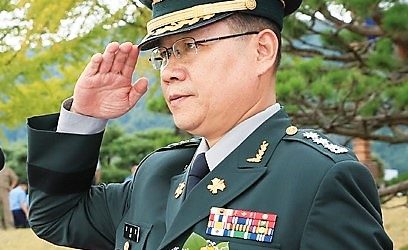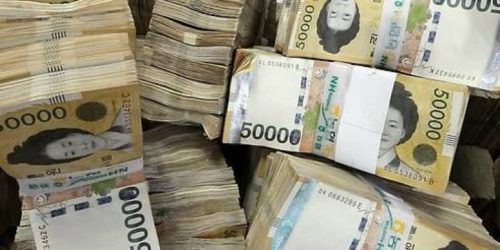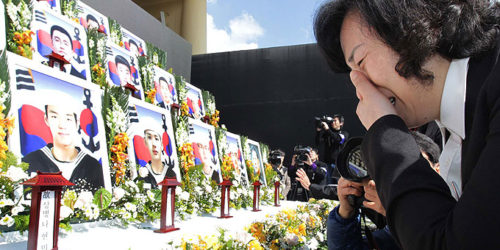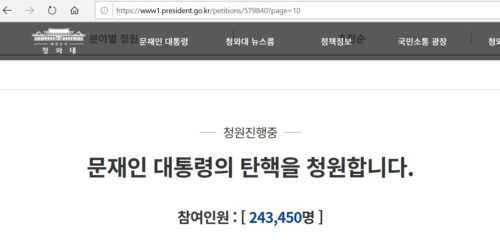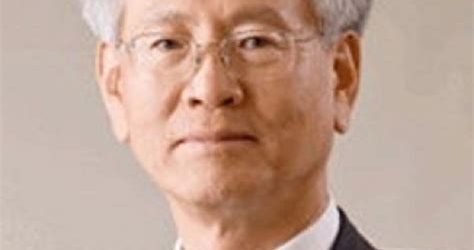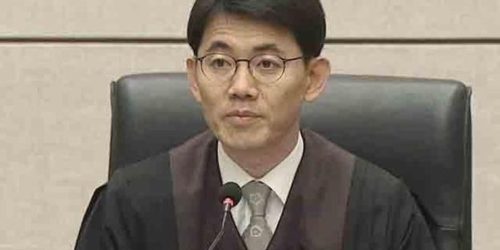Moon Appoints Lee Mi-seon while in Uzbekistan…4 of 9 Constitutional Court Judges Appointed Without Confirmation from the National Assembly
2019-4-19, Chosun.com
On April 19, 2019, President Moon Jae-in appointed Lee Mi-seon (이미선) and Moon Hyung-bae (문형배) to be judges on the constitutional court of Korea, while he was visiting Uzbekistan. Opposition parties called for Lee Mi-seon’s voluntary resignation and refused to confirm her [National Assembly confirms a nomination by adopting the report on the confirmation hearing] due to suspicions around Lee’s excessive stock transactions and possession.
[The assets of Lee Mi-seon and her lawyer husband Oh Choong-jin (오충진) are worth ₩4,560,000,000 ($4 million). 83% of that or ₩3,548,870,000 ($3.1 million) are in stocks (₩665,890,000 are under Lee’s name and ₩2,882,970,000 are under her husband Mr. Oh’s name). They have conducted over 5,000 stock transactions. In 2008, their assets were worth ₩290,000,000.][1]
[Lee Mi-seon and her husband bought OCI stocks in 2015. Currently, their OCI shares are worth ₩2.4 billion ($2.1 million), which is over half of their total assets. The owner of OCI is Mr. H, a former High court judge. Mr. Oh and Mr. H worked at the same Seoul High Court criminal department in 2005.][2]
[There are suspicions that they may have had insider knowledge in buying and selling certain stocks, including Samkwang Glass stocks. During March 13-15, 2018, they sold OCI affiliate Samkwang Glass stocks for ₩223,040,000 ($195,380) (3,804 shares at ₩58,000-59,000 per share or $50.91-51.77 per share). A week later on March 22, an external auditor, an accounting firm, commented that “the submission of the audit report was delayed.” Another week later on March 29, stock transactions were suspended due to a “limited” comment on the audit report due to inventory handling problems. The share price also nosedived from upper ₩50,000 range per share to lower ₩40,000 range per share. Two days after the stock transactions resumed (April 2), Mr. Oh bought ₩370,600,000 ($325,270) worth of Samkwang Glass stocks [8,681 shares at lower middle ₩40,000 range per share).] [3]
[The National Assembly did not confirm her, due to discord between the ruling party and the opposition parties.] Consequently, after the Moon administration began, 4 out of 8 new judges of the constitutional court were appointed without the National Assembly’s confirmation. A total of 5 judges, including the 4 newly appointed judges were members of left-leaning organizations, such as Woori Law (Our Law) Society, International Human Rights Law Society, and Minbyun (Lawyers for Democracy). These new judges now form a majority.
[Woori Law Society, Human Rights Law Society, and Minbyun are left-wing organizations. Minbyun has made several headlines recently, for activities such as taking legal actions to send back the 12 North Korean defectors who used to work at a North Korean restaurant in China after they settled in South Korea. Minbyun claimed the defectors were abducted by South Korea, although that is not what the defectors claim.]
Yoon Do-han, the Senior Presidential Secretary for Public Affairs said in a briefing, “President Moon confirmed the appointment of Moon Hyung-bae and Lee Mi-sun as judges of the constitutional court at 12:40 p.m. on the 19th (Korea time)” and “President Moon wanted to avoid vacancy of the constitutional judge positions even for a day and thus confirmed the appointment of the two candidates via electronic means while he is visiting in Uzbekistan.”
These two appointees, Moon Hyung-bae and Lee Mi-seon, will succeed Seo Ki-seog (서기석) and Cho Yong-ho (조용호), who retired the previous day [both were appointed in 2013]. On April 16, president Moon requested the National Assembly send a report on the confirmation hearing by April 16, but it failed to materialize when the Liberty Korea Party and Bareunmirae Party requested that Lee resign from her candidacy on account of allegations regarding Lee’s stock investments.
After the beginning of the current administration, 4 constitutional judges have been appointed without the National Assembly’s confirmation. Lee Mi-sun and Moon Hyung-bae, who were appointed today, and Lee Seok-tae (이석태) and Lee Eun-ae (이은애), who were nominated by the Chief Justice of the Supreme Court Kim Myung-soo (김명수), had not received confirmation from the National Assembly. The Liberty Korea Party opposed Lee Seok-tae on grounds that “there’s a problem with political neutrality,” because Lee Seok-tae served under the former leftist president Roh Moo-hyun, as well as serving as the president of Minbyun and co-president of Chamyeoyeondae (참여연대; People’s Solidarity for Participatory Democracy) [Chamyeoyeondae is a left-wing organization with over 15,000 members. They played an important role in the Korea-U.S. FTA dismissal campaign, the mad cow disease/anti-U.S. beef import demonstrations, Jeju naval base construction inhibition activities, and the Cheonan sinking ship re-investigation request. Numerous people in the Moon administration are from Chamyeoyeondae.] Concerning Lee Eun-hye, Liberty Korea Party opposed her on suspicions about her moral character, especially because of her illegal acts, including registering false residency eight times.
In contrast, 5 judges of the constitutional court have been appointed through completing the proper nomination procedure, including the National Assembly’s adoption of the report on the confirmation hearing, appointment agreement, and direct election. Before the beginning of the current government, the National Assembly confirmed Lee Seon-ae (이선애), who was recommended by Yang Seung-tae (양승태), the former Chief Justice of the Supreme Court. Lee Sun-ae took office in March 2017. Yoo Nam-seok (유남석), the current President of the Constitutional Court, was recommended by Moon and appointed through the proper procedure including National Assembly’s adoption of the report on confirmation hearing and appointment agreement. Lee Jong-seok (이종석), Lee Young-jin (이영진), and Kim Ki-young (김기영) were recommended by the National Assembly, and were also appointed with the agreement and the voting of the ruling and opposition parties. [Lee Seon-ae was appointed in 2017; the other four were appointed in 2018.]
Consequently, 5 out of 9 judges of the constitutional court now come from left-wing organizations of judges and lawyers. Yoo Nam-seok and Moon Hyeong-bae are from Woori Law Society; Kim Ki-young and Lee Mi-seon are from International Human Rights Law Society; and Lee Seok-tae is from Minbyun. The current South Korean administration has been emphasizing that personnel composition of the constitutional court should be diversified. However, in spite of this emphasis, the majority of the judges of the constitutional court have been appointed from organizations that are political, and the opposition parties have opposed their confirmations. Going beyond the question of diversification, this can cause “reverse discrimination” against the conservatives in the constitutional court.
The Constitutional Court is the final constitutional arbiter with the power to judge constitutional law. Also, it has the authority to judge impeachment trials against the president, jurisdictional disputes by the executive, legislative, and judiciary branches, and the power of dissolution over political parties it deems unconstitutional. The decisions on unconstitutionality require at least six out of nine Constitutional Court judges. With the appointment of Justices Lee Mi-seon and Moon Hyung-bae, only the president [Moon Jae-in], the chief justice [appointed by Moon Jae-in] and the ruling party [headed by Moon Jae-in] nominees fill the quorum (6 persons) necessary for judging unconstitutionality of laws [and constitutional amendments]. The laws that they agree to be unconstitutional can be discarded at any time. [truncated]
The list of people president Moon has appointed without National Assembly confirmation has increased to 13 overall. In addition to judges Lee Mi-seon and Moon Hyung-bae, the list also includes Fair Trade Commission Chairman Kim Sang-Jo (김상조), Minister of Foreign Affairs Kang Kyung-hwa, former Minister of National Defense Song Young-moo (송영무), Korea Communications Commission Chairman Lee Hyo-seong (이효성), former Minister of Small and Medium Size Enterprises (SME) and Startups (MSS) Hong Jong-hak (홍종학), Deputy Prime Minister for Society and the Minister of Education Yoo Eun-hye (유은혜), Minister of Environment Cho Myong-nae (조명래), current Minister of MSS Park Young-sun (박영선), Minister of Unification Kim Yeon-chul (김연철), President of Korea Broadcasting Service (KBS) Yang Sung-dong (양승동), and the Central Election Management Committee Standing Commissioner Cho Hae-joo (조해주).
Source: http://m.chosun.com/news/article.amp.html?sname=news&contid=2019041901344&__twitter_impression=true
Additional Sources:
